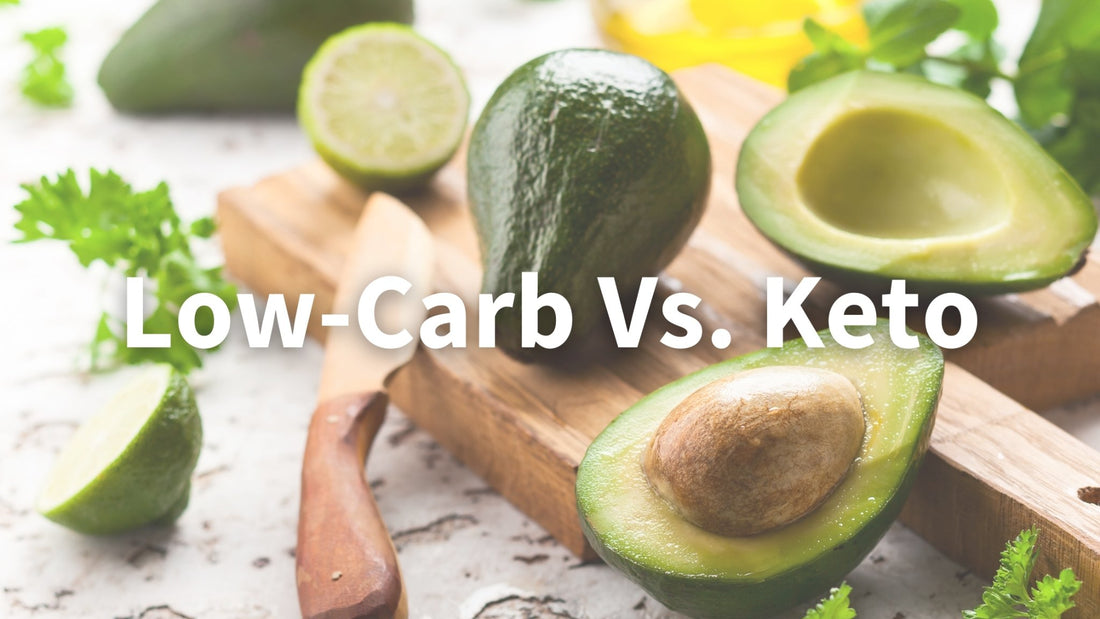
Difference Between Low-Carb Vs Strict Keto
Gloria PalcichShare
A debate that has been long-standing in the nutrition community is whether a low-carbohydrate diet or a strict ketogenic diet is better for weight loss and overall health.
Proponents of the low-carbohydrate diet argue that this approach is more effective for weight loss, while advocates of ketogenic diets maintain that their approach results in better overall health.
This blog post will compare and contrast these two approaches to see what are their major differences.
What is the Difference Between Low-Carb and Keto?
The biggest difference is the number of carbs allowed in both eating approaches. The keto diet requires that you consume very few carbohydrates, typically no more than 20 - 50 grams per day. This lack of carbs puts your body into a metabolic state known as ketosis, where it begins burning fat for energy instead of glucose.
The low-carb diet, on the other hand, does not aim to put your body into ketosis. Instead, it simply restricts the number of carbs you eat to anywhere between 50 - 150 grams per day in order to encourage weight loss.
Protein intake is another key difference. Keto diets should maintain a moderate protein intake of about 20% of total calories, as opposed to low-carb diets which may require a high protein intake. The reason for this is that too much protein can prevent ketosis from occurring.
Furthermore, approximately 70% of the calories consumed on a ketogenic diet are derived from fat. While following a low-carb diet, is typically around 50% or less, as there is less emphasis placed on eating high-fat.
Some people may find this diet easier to stick to than a strict keto diet, particularly if they prefer to consume more carbs.
Which is the healthier low-carb or keto?
There is no simple answer to the question of which diet is better for overall health – low-carb or keto. Both diets have their pros and cons, and the best diet for any individual depends on a variety of factors, including overall health, fitness goals, and food preferences.
The ketogenic diet is, however, more effective in regard to weight loss than the low-carb diet. Because on a low-carb diet if you consume 150 grams of carbohydrates per day, you won't be able to reach or maintain ketosis which means the body won't be able to use stored fat for fuel.
Therefore, if you're serious about losing weight, you might as well go the extra step and enter ketosis to see if it feel good for your body.
The ketogenic diet for many, allows for fat burning which leads to weight-loss faster than general low-carb. Additionally, because on a ketogenic diet you're strictly tracking your macros, more people are likely to stick within the macro goals. On a general low-carb diet, you will need to define your limits yourself without being too loose about how many carbs are too many.
People may also find it best to optimize their mental health by eating low-carb and high-fat foods. The results of a recent study suggest that a low-carbohydrate diet may have beneficial effects on moods and the regulation of hunger hormones. [1]
There are instances where a keto diet may not be appropriate, and something more moderate like low-carb eating would be best. Ultimately, it is the way of eating that is most sustainable for your body that will yield the best results.
Nevertheless, both approaches can reduce inflammation, which leads to improved insulin sensitivity in people with diabetes. [2]
Bottomline
So, which is better – low-carb or keto? The answer depends on your individual needs and goals. If you’re looking to lose weight or improve your blood sugar, then the keto diet may be worth considering.
However, if you have health concerns or you don’t think you could stick to restricting carbs to a minimum of 20 grams per day, then a low-carb diet may be a better option. Speak with your doctor or consult a nutritionist to determine a customized eating plan for your individual needs.
References
